|
Shabri was queen in her previous life. She was doing service with the wealth. Once, she went Prayagraj and met several sages. She desired to meet pure sage and died in triveni sangam. In her next life, she was born in Bheel tribe.
Shabri was getting married. On the day of wedding, her father made huge preparations. A large number of goats were brought. They were to be cooked. Shabri thought, this violence would take place due to her. She decided to leave the house. She left the house in mid night. She stayed on the bank Pampa River near Matang sage hermitage. The Matang sage used to kill one elephant in a year and devour on him whole of the year. When other sages decried him; he said, they killed many animals in a year and he killed only one. Shabri started cleaning the path of sages on which they came to take the bath in Pampa River. Matang sage asked about her caste. She told correctly. Matang sage thought that she is of low caste but not of low in deeds. He told her to stay in his hermitage. She was pure but people were criticizing sage saying that he has kept one Bheel girl. The sage initiated her in mantras of Shri Rama. One day, Matang sage was in his last stage. Shabri was distressed. She asked him who would take her care. The sage said to her that she has been trained in Ram-mantras. She should keep trust. One day, Shri Rama would arrive in her residence. The day cannot be predicted but he has already appeared in Ajodhya. Shabri collected berries & other fruits daily and waited Shri Rama whole day. In the evening she used to distribute the fruits among children of sages which were brought for Shri Rama. Her time passed in waiting and she turned old. But she was living in hope as the guru ji told her. Shabri chanted Shri Rama mantras whole of the day and led a restraint life. When Shri Rama and Shri Laxmana arrived at Pampa River, the sages welcomed them and asked to visit their hermitages. Shri Rama said, first he would go to the hermitage of Shabri. When Shri Rama & Shri Laxmana reached hermitage of Shabri, she was chanting Rama mantras. Shabri welcomed them and offered seat. She told Shri Rama that she is from low tribe but surrenders herself to him. Shri Rama told her that he understand devotion only and nothing else. Shabri brought berries and offered everybody after tasting. She forgot that she is offering half eaten fruits. Shri Rama asked her, if she has any desire. Shabri asked Shri Rama to purify the Pampa River water. Once, one sage hit Shabri with his feet which polluted water of the River. Shri Rama told that it could be purified by Shabri only. Shabri was made to take bath in the River and water of Pampa River was purified. Shabri left for heaven after seeing Shri Rama. Spiritual Significance:
Shri Shrimad Bhagwat Rehsaya by Shri Ramchandra Keshav Dongra ji Maharaj
1 Comment
Rishi Vishwamitra used to perform Yajna. Mareech, Subahu etc. had always interrupted in Yajna. Vishwamitra rishi thought to bring Shri Rama to save the yajna. Vishwamitra visited Ajodhya, took a dip in Saryu River and reached in the assembly of Raja Dashratha. Dashratha ji welcomed him and said, due to good deeds of his ancestors, such a revered rishi came to his place. Raja Dashratha asked what service he could do for him. Vishwamitra blessed him and said to Raja Dashratha that his yajna has been interrupted by the Rakshasa and asked to send Shri Rama to save it. Raja Dasratha was trembled.
Raja Dashratha said to the rishi that he has got the sons in the old age with his blessings. He has four sons but Shri Rama is most affectionate to him. He could not survive without him. Shri Rama is very innocent, obedient, loves his brothers and pay high respect to him. Raja Dashratha became emotional while praising Shri Rama. Raja Dashratha pleaded the rishi that he could take his entire kingdom instead of Shri Rama as he is his life. Vashisht ji explained Raja Dashratha that as per astrology, this year is destined for wedding of Shri Rama and his brothers. Hence, there is no hindrance in sending him. Vashisht ji said that he believes Vishwamitra has come for their wedding. Raja Dashratha was much elated to hear about their wedding. Then Raja Dashratha was ready to send Shri Rama. Shri Laxmana insisted to come along with Shri Rama to escort him. Both came in assembly and saluted everybody. Raja Dashratha asked them to save yajna of Vishwamitra. They readied and went to Mata Kaushaliya for blessings. She gave blessings and asked to obey the directions of their father. Shri Rama and Laxmana walked along with Vishwamitra. On the way, they elevated Tarka. Vishwamitra was having his hermitage near Janakpur (now in Nepal). Shri Rama and Shri Laxmana started surveillance of yajna. Vishwamitra was offering the oblations in the fire and staring Shri Rama & Shri Laxmana. Rakshasa reached to interrupt yajna. Repeated vision of Shri Rama, nature of Mareech transformed. He thought that interruption of yajna performed by Vishwamitra should not be done. He pondered over his transformation and concluded that by seeing the Shri Rama & Shri Laxmana, such thoughts have arisen. Before completion of yajna, invitation came from Janakpur for the Swaymvar (selection of bride-groom) of Sita. Vishwamitra moved to Janakpur along with Shri Rama and Shri Laxmana after completion of yajna. On the way, Vishwamitra advised Shri Rama to touch a rock which was Ahilea. Ahilea came alive. Ahilea saluted Shri Rama. Gautam rishi, husband of Ahilea came there. Gautam rishi blessed Shri Rama that he would marry to a virtuous girl. Spiritual Significance: Yajna, Swadhya, Tapas and Dhyana do chitshudhi (चितशुद्धि). Chitshudhi does vision of almighty. Source: Shrimad Bhagwat Mahapuran Dharma, Artha, Kama and Moksha are the purposes of life defined in Hinduism. The Moksha is ultimate destination of life. Various Hindu scriptures, especially Shrimad Bhagavad Gita enlightened the four paths of Moksha or self-realisation or enlightenment viz. the path of wisdom (Jnana yoga), the path of devotion (Bhakti yoga), the path of action (Karma yoga), and the path of meditation (Raja yoga).
The prevalence of the different paths has been in four yugas. In Satya-yuga, the path of meditation and Yagas, in Treta-yuga, the path of worship by the rituals and asceticism, in Dvapara-yuga, by following the path of ritual worship as per prescriptions of both the Vedas and tantras and in the Kali-yuga, the paths of Jnana and the Bhakti are predominant. Medieval India saw upsurge of Bhakti movement. Saint Tulsidas (born in Kashi now called as Varanasi, UP, year- 1478-1624 AD), one of proponent of bhakti movement, authored Ram-Charitr-Manas in seven chapters, detailing about life of Maryada Purushottam Bhagwan Shri Rama. In fifth chapter named as Sunder Kanda, he vividly explained about crossing of Indian Ocean by Shri Hanuman, entering into Lanka in search of Ma Sita, the meetings with Sursa, Demoness, Lankani, Vibhishan, Ma Sita, Meghnath & Ravana in Lanka, return to Kishkindha and other accounts about movement of army of Shri Rama near Ocean to cross it. Sunder-Kanda means “beautiful-Chapter”. Sunder- Kanda is so called because it gives a detailed account of a devotee's journey on the path of a virtuous life and spiritual transformation. Shri Hanuman, the devotee is inspired by ‘Jamvant’, who symbolizes intelligence; motivates Hanuman to move ahead in spiritual journey. Sense control is the bridge through which one can cross the ocean of mundane attachments. If a seeker lives with discipline, he will not drown in the ocean of mundane attachments. On the way of spiritual journey, many people and situations create obstacles in the spiritual progress. Both, the paths of Jnana and Bhakti are revealed in the Chanting of Sunder Kanda.
The Sunder-Kanda helps human beings in Kalyug to overcome problems. It has been sung by Tulsidas & anyone who says it, can go through life without pain & difficulty, as Shri Ram is an Ocean of Peace & happiness. (यह चरित कलि मल हर जथामति दास तुलसी गायऊ॥ सुख भवन संसय समन दवन बिषाद रघुपति गुन गना। तजि सकल आस भरोस गावहि सुनहि संतत सठ मना॥ 5/60) In Ram Charitra Manas, Sri Ram Charitra Manas (RCM) is adjudged a wonderful poetry on life of Sri Ram, written by Sh. Tulsidas and completed in 1633. It enlightens the ideals of family life, highest standards for king, husband, wife and brother. Besides, it gives explanations on devotion (Bhakti, भक्ति), Spiritual wisdom (Gyan, ज्ञान), Sacrifice (tyag, त्याग), Dispassion, Detachment (vairagia, वैराग्य), Illusion (Maya, माया), Delusion (Bhram, भ्रम), Infatuation (Moh, मोह) and morality (sadachar, सदाचार). Reference:
1. In Ram Charitra Manas, Sri Ram has explained following nine auspicious characteristics of a saint to Sri Parsuram in Balkand: 1. Tranquillity (शम), 2. Restraint (दम), 3. Penance (तप), 4. Purity (शौच), 5. Forbearance (क्षमा), 6. Straight forwardness (सरलता), 7. Knowledge (ज्ञान), 8. Supreme knowledge (विज्ञान) and 9. Faith in god (आस्तिकता) 2. Sri Ram further, explained Narad ji about characteristics of saints when he meets him in dense forest of south, as under:
Reference: Ram Charitra Manas written by Tulsidas:
In Ram Charitra Manas, Sri Ram has explained to Sri Hanuman difference between Characteristics of saints and of wicked in uttarakand as under:
Characteristics of Saints
Characteristics of Impious / Wicked
Reference: Ram Charitra Manas written by Tulsidas: उत्तरकांड, 37 वे दोहे के बाद, 1 से 4 चौपाईया मे, 38 दोहा, - बिषय अलंपट सील गुनाकर। पर दुख दुख सुख सुख देखे पर।। सम अभूतरिपु बिमद बिरागी। लोभामरष हरष भय त्यागी।। कोमलचित दीनन्ह पर दाया। मन बच क्रम मम भगति अमाया।। सबहि मानप्रद आपु अमानी। भरत प्रान सम मम ते प्रानी।। बिगत काम मम नाम परायन। सांति बिरति बिनती मुदितायन।। सीतलता सरलता मयत्री। द्विज पद प्रीति धर्म जनयत्री।। ए सब लच्छन बसहिं जासु उर। जानेहु तात संत संतत फुर।। सम दम नियम नीति नहिं डोलहिं। परुष बचन कबहूँ नहिं बोलहिं।। दो0-निंदा अस्तुति उभय सम ममता मम पद कंज। ते सज्जन मम प्रानप्रिय गुन मंदिर सुख पुंज।।38।। उत्तरकांड, 38 वे दोहे के बाद, 1 से 4 चौपाईया मे - सनहु असंतन्ह केर सुभाऊ। भूलेहुँ संगति करिअ न काऊ।। तिन्ह कर संग सदा दुखदाई। जिमि कलपहि घालइ हरहाई।। खलन्ह हृदयँ अति ताप बिसेषी। जरहिं सदा पर संपति देखी।। जहँ कहुँ निंदा सुनहिं पराई। हरषहिं मनहुँ परी निधि पाई।। काम क्रोध मद लोभ परायन। निर्दय कपटी कुटिल मलायन।। बयरु अकारन सब काहू सों। जो कर हित अनहित ताहू सों।। झूठइ लेना झूठइ देना। झूठइ भोजन झूठ चबेना।। बोलहिं मधुर बचन जिमि मोरा। खाइ महा अति हृदय कठोरा।। उत्तरकांड, 39 दोहा, 39 वे दोहे के बाद, 1 से 4 चौपाईया मे - दो0-पर द्रोही पर दार रत पर धन पर अपबाद। ते नर पाँवर पापमय देह धरें मनुजाद।।39।। लोभइ ओढ़न लोभइ डासन। सिस्त्रोदर पर जमपुर त्रास न।। काहू की जौं सुनहिं बड़ाई। स्वास लेहिं जनु जूड़ी आई।। जब काहू कै देखहिं बिपती। सुखी भए मानहुँ जग नृपती।। स्वारथ रत परिवार बिरोधी। लंपट काम लोभ अति क्रोधी।। मातु पिता गुर बिप्र न मानहिं। आपु गए अरु घालहिं आनहिं।। करहिं मोह बस द्रोह परावा। संत संग हरि कथा न भावा।। अवगुन सिंधु मंदमति कामी। बेद बिदूषक परधन स्वामी।। बिप्र द्रोह पर द्रोह बिसेषा। दंभ कपट जियँ धरें सुबेषा।। In Ram Charitra Manas, Sage Valmiki ji says to Sri Ram that Sri Ram along with Ma Sita and Sh. Laxman, (should) abide in hearts of those who following characteristics:
References: Ram Charitra Manas written by Tulsidas: “अयोध्याकांड, 127 वे दोहा के बाद 3,4 चौपाई - भरहिं निरंतर होहिं न पूरे। तिन्ह के हिय तुम्ह कहुँ गृह रूरे।। लोचन चातक जिन्ह करि राखे। रहहिं दरस जलधर अभिलाषे।। निदरहिं सरित सिंधु सर भारी। रूप बिंदु जल होहिं सुखारी।। तिन्ह के हृदय सदन सुखदायक। बसहु बंधु सिय सह रघुनायक।।, अयोध्याकांड,128 वे दोहा के बाद 1,2,3,4 चौपाई - प्रभु प्रसाद सुचि सुभग सुबासा। सादर जासु लहइ नित नासा।। तुम्हहि निबेदित भोजन करहीं। प्रभु प्रसाद पट भूषन धरहीं।। सीस नवहिं सुर गुरु द्विज देखी। प्रीति सहित करि बिनय बिसेषी।। कर नित करहिं राम पद पूजा। राम भरोस हृदयँ नहि दूजा।। चरन राम तीरथ चलि जाहीं। राम बसहु तिन्ह के मन माहीं।। मंत्रराजु नित जपहिं तुम्हारा। पूजहिं तुम्हहि सहित परिवारा।। तरपन होम करहिं बिधि नाना। बिप्र जेवाँइ देहिं बहु दाना।। तुम्ह तें अधिक गुरहि जियँ जानी। सकल भायँ सेवहिं सनमानी।।, अयोध्याकांड, 129 वे दोहा के बाद 1,2,3,4 चौपाई - काम कोह मद मान न मोहा। लोभ न छोभ न राग न द्रोहा।। जिन्ह कें कपट दंभ नहिं माया। तिन्ह कें हृदय बसहु रघुराया।। सब के प्रिय सब के हितकारी। दुख सुख सरिस प्रसंसा गारी।। कहहिं सत्य प्रिय बचन बिचारी। जागत सोवत सरन तुम्हारी।। तुम्हहि छाड़ि गति दूसरि नाहीं। राम बसहु तिन्ह के मन माहीं।। जननी सम जानहिं परनारी। धनु पराव बिष तें बिष भारी।। जे हरषहिं पर संपति देखी। दुखित होहिं पर बिपति बिसेषी।। जिन्हहि राम तुम्ह प्रानपिआरे। तिन्ह के मन सुभ सदन तुम्हारे।।, अयोध्याकांड, 130 वे दोहा के बाद 1,2,3,4 चौपाई - अवगुन तजि सब के गुन गहहीं। बिप्र धेनु हित संकट सहहीं।। नीति निपुन जिन्ह कइ जग लीका। घर तुम्हार तिन्ह कर मनु नीका।। गुन तुम्हार समुझइ निज दोसा। जेहि सब भाँति तुम्हार भरोसा।। राम भगत प्रिय लागहिं जेही। तेहि उर बसहु सहित बैदेही।। जाति पाँति धनु धरम बड़ाई। प्रिय परिवार सदन सुखदाई।। सब तजि तुम्हहि रहइ उर लाई। तेहि के हृदयँ रहहु रघुराई।। सरगु नरकु अपबरगु समाना। जहँ तहँ देख धरें धनु बाना।। करम बचन मन राउर चेरा। राम करहु तेहि कें उर डेरा।।, अयोध्याकांड,131 वा दोहा - जाहि न चाहिअ कबहुँ कछु तुम्ह सन सहज सनेहु। बसहु निरंतर तासु मन सो राउर निज गेहु।।)” What is Bhakti:
In Ram Charitra Manas, Sri Ram has explained to all Ajodhya citizens about Bhakti as under:
Bhakti v/s Gyan: Sri Ram ji further explained to Laxman ji near Godavari river in Parnkuti on Bhakti as under
Importance of Bhakti: In Balkand, importance of Bhakti is well explained as under:
References: Ram Charitra Manas written by Tulsidas:
उत्तरकांड, 45 वे दोहे के बाद, 3 से 4 चौपाईया मे - बैर न बिग्रह आस न त्रासा। सुखमय ताहि सदा सब आसा।। अनारंभ अनिकेत अमानी। अनघ अरोष दच्छ बिग्यानी। प्रीति सदा सज्जन संसर्गा। तृन सम बिषय स्वर्ग अपबर्गा।। भगति पच्छ हठ नहिं सठताई। दुष्ट तर्क सब दूरि बहाई।। उत्तरकांड, 61 वा दोहा - बिनु सतसंग न हरि कथा तेहि बिनु मोह न भाग। मोह गएँ बिनु राम पद होइ न दृढ़ अनुराग।।
In Ram Charitra Manas, Sri Ram ji has explained to Laxman ji near Godavari river in Parnkuti about Maya, Gyan, Vairagia, difference between God & Soul. Sri Ram has described nine forms of Bhakti as under: Nine forms of Bhakti viz. Sravana (श्रवण, listening of god’s praises & stories), kirtana (कीर्तन, chanting of god’s praises & stories), Smarana (स्मरण, fixing of one’s thoughts in god), Padasevana (पादसेवा, adoring god’s feet), Archana (अर्चना, worshipping god’s image), Vandana (वंदना, making obeisance to god), Dasya (दास्य, offering devout services to god), Sakhya (सखाया, cultivating friendship with god), Atmanivedana (आत्मनिवेदन, offering oneself to god). Sri Ram ji has further explained nine forms of Bhakti to Shabri when he visits her ashram in dense forest of south. The description of navdha bhakti is given as under:
Reference: Ram Charitra Manas written by Tulsidas: अरण्यकांड, 15 वे दोहे के बाद, 4 से 6 चौपाईया मे - एहि कर फल पुनि बिषय बिरागा। तब मम धर्म उपज अनुरागा।। श्रवनादिक नव भक्ति दृढ़ाहीं। मम लीला रति अति मन माहीं।। संत चरन पंकज अति प्रेमा। मन क्रम बचन भजन दृढ़ नेमा।। गुरु पितु मातु बंधु पति देवा। सब मोहि कहँ जाने दृढ़ सेवा।। मम गुन गावत पुलक सरीरा। गदगद गिरा नयन बह नीरा।। काम आदि मद दंभ न जाकें। तात निरंतर बस मैं ताकें।। अरण्यकांड, 34 वे दोहे के बाद, 4 चौपाई मे, 35 दोहा, 35 वे दोहे के बाद, 1 से 4 चौपाईया मे - नवधा भगति कहउँ तोहि पाहीं। सावधान सुनु धरु मन माहीं।। प्रथम भगति संतन्ह कर संगा। दूसरि रति मम कथा प्रसंगा।। गुर पद पंकज सेवा तीसरि भगति अमान। चौथि भगति मम गुन गन करइ कपट तजि गान।।35।। मंत्र जाप मम दृढ़ बिस्वासा। पंचम भजन सो बेद प्रकासा।। छठ दम सील बिरति बहु करमा। निरत निरंतर सज्जन धरमा।। सातवँ सम मोहि मय जग देखा। मोतें संत अधिक करि लेखा।। आठवँ जथालाभ संतोषा। सपनेहुँ नहिं देखइ परदोषा।। नवम सरल सब सन छलहीना। मम भरोस हियँ हरष न दीना।। नव महुँ एकउ जिन्ह के होई। नारि पुरुष सचराचर कोई।। सोइ अतिसय प्रिय भामिनि मोरे। सकल प्रकार भगति दृढ़ तोरें।। जोगि बृंद दुरलभ गति जोई। तो कहुँ आजु सुलभ भइ सोई।। मम दरसन फल परम अनूपा। जीव पाव निज सहज सरूपा।। जनकसुता कइ सुधि भामिनी। जानहि कहु करिबरगामिनी।। पंपा सरहि जाहु रघुराई। तहँ होइहि सुग्रीव मिताई।। सो सब कहिहि देव रघुबीरा। जानतहूँ पूछहु मतिधीरा।। बार बार प्रभु पद सिरु नाई। प्रेम सहित सब कथा सुनाई।।
Gyan (spiritual wisdom) is one which is free from all flaws such as self-pride and sees supreme spirit equally in all. Srimad Bhagavadgita enumerates the 18 characteristics which make for spiritual wisdom. They are:
Kakabhusundi ji has further explained to Gaurda as under:
Reference:
उत्तरकांड, 89 दोहा और 89 वे दोहे के बाद, 1 से 4 चौपाईया मे, 90 दोहा - सो0-बिनु गुर होइ कि ग्यान ग्यान कि होइ बिराग बिनु।गावहिं बेद पुरान सुख कि लहिअ हरि भगति बिनु।।89(क)।। कोउ बिश्राम कि पाव तात सहज संतोष बिनु। चलै कि जल बिनु नाव कोटि जतन पचि पचि मरिअ।।89(ख)।। बिनु संतोष न काम नसाहीं। काम अछत सुख सपनेहुँ नाहीं।। राम भजन बिनु मिटहिं कि कामा। थल बिहीन तरु कबहुँ कि जामा।। बिनु बिग्यान कि समता आवइ। कोउ अवकास कि नभ बिनु पावइ।। श्रद्धा बिना धर्म नहिं होई। बिनु महि गंध कि पावइ कोई।। बिनु तप तेज कि कर बिस्तारा। जल बिनु रस कि होइ संसारा।। सील कि मिल बिनु बुध सेवकाई। जिमि बिनु तेज न रूप गोसाई।। निज सुख बिनु मन होइ कि थीरा। परस कि होइ बिहीन समीरा।। कवनिउ सिद्धि कि बिनु बिस्वासा। बिनु हरि भजन न भव भय नासा।। दो0-बिनु बिस्वास भगति नहिं तेहि बिनु द्रवहिं न रामु। राम कृपा बिनु सपनेहुँ जीव न लह बिश्रामु।।90(क)।। सो0-अस बिचारि मतिधीर तजि कुतर्क संसय सकल। भजहु राम रघुबीर करुनाकर सुंदर सुखद।।90(ख)।।) उत्तरकांड, 103 (खा) दोहा - प्रगट चारि पद धर्म के कलिल महुँ एक प्रधान। जेन केन बिधि दीन्हें दान करइ कल्यान।। |
Archives
April 2020
Categories |
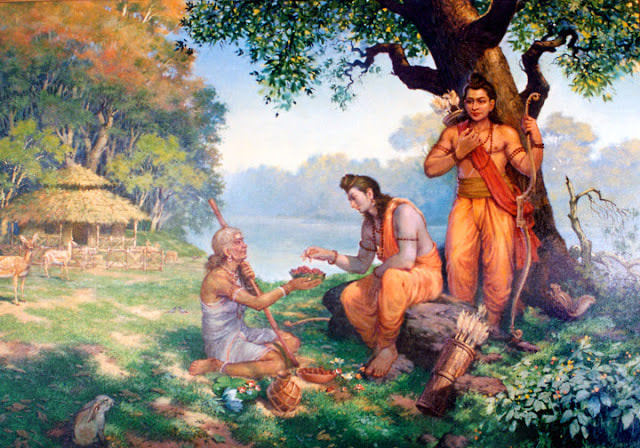
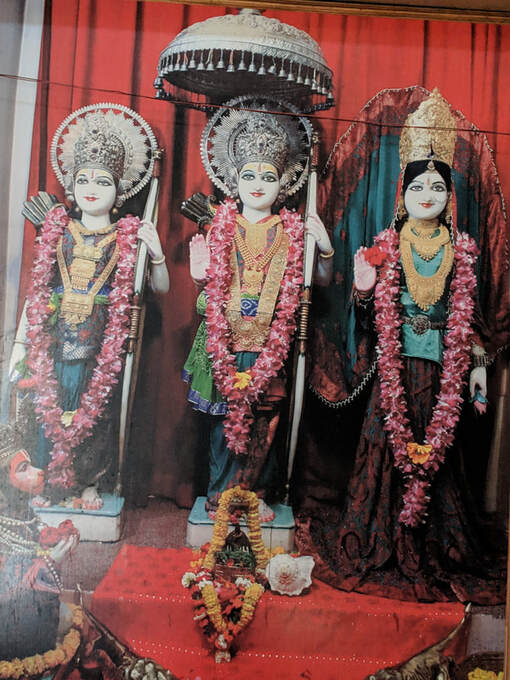
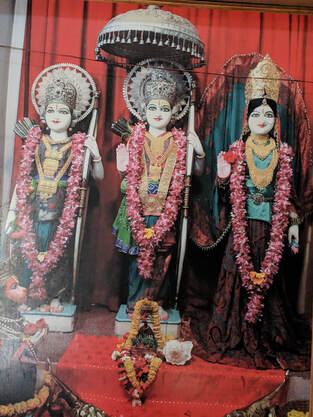
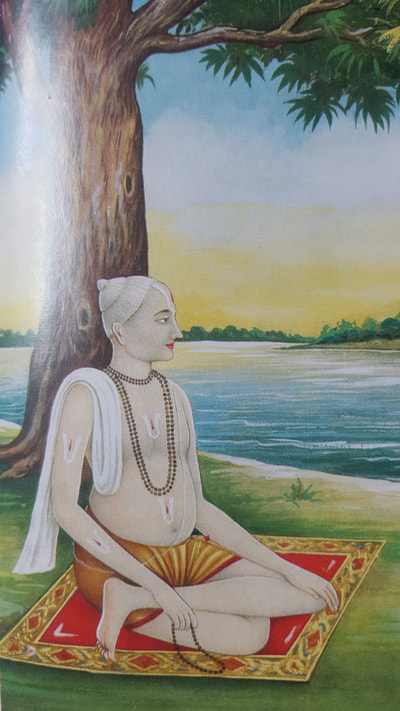
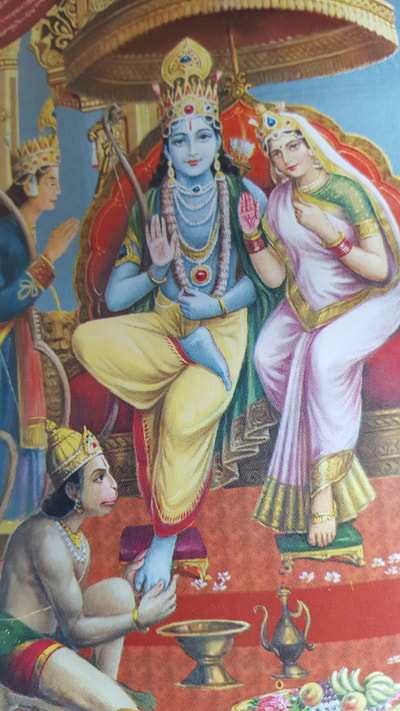
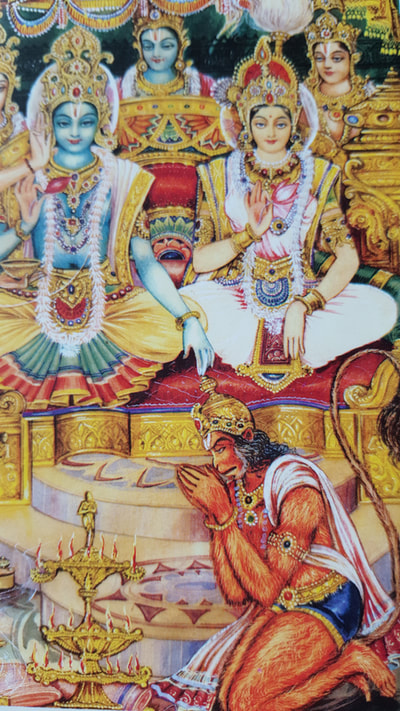
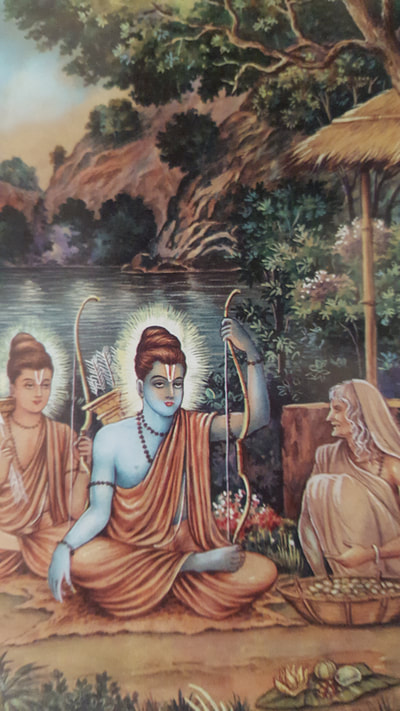
 RSS Feed
RSS Feed